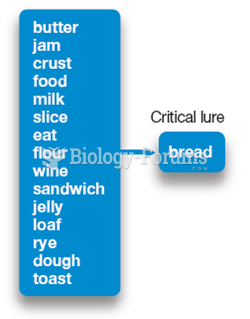This topic contains a solution. Click here to go to the answer
|
|
|
Did you know?
Vampire bats have a natural anticoagulant in their saliva that permits continuous bleeding after they painlessly open a wound with their incisors. This capillary blood does not cause any significant blood loss to their victims.
Did you know?
Always store hazardous household chemicals in their original containers out of reach of children. These include bleach, paint, strippers and products containing turpentine, garden chemicals, oven cleaners, fondue fuels, nail polish, and nail polish remover.
Did you know?
There are more sensory neurons in the tongue than in any other part of the body.
Did you know?
There are 20 feet of blood vessels in each square inch of human skin.
Did you know?
Blood is approximately twice as thick as water because of the cells and other components found in it.







